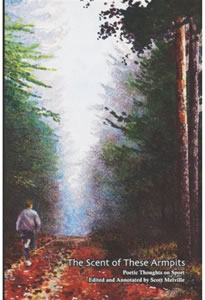
The
Scent of These Armpits: Poetic Thoughts
on Sport
Publisher:
BookSurge Publishing
Pub. Date:
December 14, 2007
ISBN-10:
1419678736
ISBN-13:
978-1419678738
Edition
Description: paperback,
304 pages
Reviewer: Joseph Powell,
Professor, English, Central Washington
University
I must admit that I was immediately attracted
to Scott Melville's anthology by the title.
It suggested a rather unsentimental compilation
of poems and writing about the sweaty
business of sport. He takes his title
from Walt
Whitman, that poet of lived life in
its full sweep of triumph, sensuality,
failure, contradictions, and generosity.
Melville has a kind of Whitmanesque apprehension
of sport that runs from a mawkish, unapologetic
endorsement to wry, hard-headed examinations
of its complexities and difficulties.
Both the way he has organized his material
and wide ranging examples speak to his
abiding love of sports.
The chapters are divided into poems about
the joys of sport, the drama of it, the
various skills required, philosophizing
about it, aging and death in sport, and
wellness. Each of these chapters has twenty
to forty entries, and every entry has
a brief biographical note about the author.
These authors range from the most obscure
to the most famous writers in English.
For example, there is a poem by John
Gillespie Magee, Jr. who died in WWII
on a bombing mission, but sent home a
poem about flying three months before
he died, and there are poems by Vigil,
Wordsworth, Dickinson, Shakespeare, and
Yeats. Yet there is also a fair and just
sampling of fine contemporary American
poets who would be obscure to most Americans,
but famous among poets: writers like C.
K. Williams, Robert Francis, Linda Pastan,
Donald Hall, Maxine Kumin, Peter Meinke,
A. R. Ammons, Stephen Dunn, Gwendolyn
Brooks, etc.
This project was clearly a labor of love
that must have consumed thousands of hours
of reading and research and note-taking
and categorizing. The breadth and inclusiveness
of material are matched by the inclusiveness
of sporting activity. In the Preface,
Melville says "I am broadly defining
sport to encompass young and old, male
and female, as they engage in and reflect
upon their diverse athletic endeavors."
Besides the predictable array of sports,
he includes almost any activity that requires
some physical output and may have an aesthetic
attraction to participants like canoeing,
dancing, fishing, juggling, skateboarding,
sledding, stationary bicycling, and walking.
His aesthetic principle for choosing pieces
was that "all selections avoid obscurity
and ring with a beautiful clarity."
He certainly delivers on this promise.
Even the poems and scraps of prose that
seem to be conventional in sentiment usually
have redeeming descriptions of the activities
they describe which make the reading worthwhile.
Although these descriptions are often
charming, my favorite section in the book
is "Philosophizing About Sports,"
which looks at the underside of human
endeavor and tries to make sense of it
on the deepest levels. For example, in
Pat Conroy's piece called "My Losing
Season," he says "Winning is
wonderful in every aspect, but the darker
music of loss resonates on deeper, richer
planes. . .Winning makes you think you'll
always get the girl, land the job, deposit
the million-dollar check, win the promotion,
and you grow accustomed to a life of answered
prayers. Winning shapes the soul of bad
movies and novels and lives. It is the
subject of thousands of insufferably bad
books and is often a sworn enemy of art.
Loss is a fiercer, more uncompromising
teacher, coldhearted but clear-eyed in
its understanding that life is more dilemma
than game, and more trials than free pass"
(118).
In a culture whose predominate values
center on success, fame, and victory,
we need these reminders that loss is a
better teacher, that emotional drive is
complicated ("See
the son of grief at cricket/ Trying to
be glad") (128), that "excellence
is millimeters not miles" (112),
that pain has its value. Ronald Wallace
wrote a poem about a Miss Bricka who lost
in a semi-final round in a Pennsylvania
tennis tournament in which he says, "Bluely,
loss/ hurts in your eyes—not loss
merely, / but seeing how everything is
less/ that seemed so much, how life moves
on/ past either defeat or victory/ how,
too old to cry, you shall find steps to
turn away" (145). It is reading poems
and prose like this that helps us find
the steps to turn away with some dignity,
some resolve, some lessons learned.
However, this book essentially celebrates
motion, the joys of physicality unperfumed.
It is a marvelous tribute to activity,
our bodies in the act of striving, taking
full pleasure in being alive no matter
how old we are.
|



